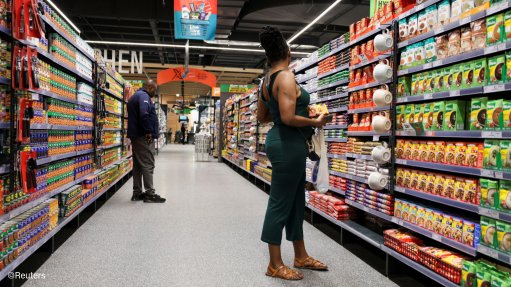Trust in innovation needs to be built up to change societies, economies
Globally and in South Africa, twice as many people are likely to believe that technological innovation is being poorly managed than those who believe it is being managed well.
This could have a significant impact as, when institutions mismanaged innovation, there was more rejection and less enthusiasm for emerging technologies, said communications firm Edelman South Africa CEO Karena Crerar.
"Innovation in science, technology, products and services can foster success and prosperity, or they can lead to a backlash with people rejecting them. Whether society accepts or rejects innovation can have an impact on the future," she said in a March 19 discussion.
Further, mismanaged innovation can lead to people feeling that both technology and society are leaving them behind, the 2024 'Edelman South Africa Trust Barometer' shows.
Confidence in effective regulation drives adoption, and when people were confident that regulations were effective, there was a marked increase in people willing to embrace innovation, Crerar noted.
Additionally, there was greater acceptance among those who felt that people like them had a lot of control over how innovations affected their lives. There was much more acceptance among those with high confidence that each innovation would lead to a better future, she noted.
"For example, while trust in South Africa’s energy sector is relatively low at 58%, trust in green energy innovations is considerably higher at 73%. This disparity may, however, stem from South Africa's ongoing energy challenges.
"Conversely, despite a 76% trust level in the technology sector, South Africans are divided on the adoption of artificial intelligence (AI), with equal percentages of 33% each embracing and rejecting it."
This illustrated that trust in industry sectors did not guarantee trust in industry innovations, Crerar noted.
However, it was not only acceptance of technologies that was at stake, as Edelman's research over the past 24 years of the Trust Barometer showed a link between technological and societal change, she pointed out.
"A key finding in the 2024 Trust Barometer is that about twice as many respondents believe innovation is being poorly managed at 42% of respondents in South Africa, compared to those who believe innovation is being well managed at 22%, with the remaining 36% believing innovation is being managed neither poorly nor well."
This meant that much of society did not trust business, nongovernmental organisations (NGOs) or government to introduce innovations into society, and did not trust that science was being conducted independently of politics and commercial considerations, Crerar said.
Further, the main concerns people had in terms of innovation remained economic fears, with 93% of respondents in South Africa concerned about potential job loss, she said.
The Trust Barometer also showed that trust in institutions in South Africa is out of balance, with government seen as far less competent and ethical than business.
Business is the most trusted institution to integrate innovation into society in South Africa, with 65% of respondents indicating their trust in business to do this, followed by 58% of people trusting NGOs to integrate innovation into society.
Media, at 46% of respondents, and government, at 36% of respondents, were the least trusted institutions to integrate innovation into society, she said.
Additionally, 63% of respondents in South Africa, and 59% globally, said that government regulators lack an adequate understanding of emerging technologies to regulate them effectively.
Further, mismanagement of innovation by institutions also led to people questioning the fairness of the impact of the innovation, she added.
"There is a 19 percentage point difference between those respondents who believe that an innovation is biased towards the rich when the innovation is perceived as poorly managed, compared to the results when an innovation is perceived as well managed," she noted.
Meanwhile, in terms of whom they trusted to tell the truth about new innovations and technologies, 68% of respondents to the Trust Barometer said they trust scientists, 66% said they trust company technical experts, 56% said they trust NGO representatives and 53% of respondents said they trust CEOs to tell the truth about innovations and technologies.
This is in contrast to respondents saying only 45% of journalists and 27% of government leaders can be trusted to tell the truth about new innovations and technologies.
These differences in trust of institutions have led globally and in South Africa to a marked increase in demand for business-government partnerships on innovation, with a 15 percentage point increase in demand for public-private partnerships globally to 60% from 2015 to 2024, and a 26 percentage point increase in South Africa to 61% of respondents over the past decade.
"Most respondents believe partnerships between these institutions can lead to more trustworthy management of technology-led changes, which will propel progress and growth for the country," Crerar said.
"Institutions can no longer ignore the importance of collaboration when garnering the trust of South Africans on scientific innovation."
Restoring trust in the promise of innovation necessitates prioritising its implementation as much as the innovation itself, creating an environment for business to partner for change, integrating science with society, and giving people control over how innovation impacts their future, she advised.
Article Enquiry
Email Article
Save Article
Feedback
To advertise email advertising@creamermedia.co.za or click here
Announcements
What's On
Subscribe to improve your user experience...
Option 1 (equivalent of R125 a month):
Receive a weekly copy of Creamer Media's Engineering News & Mining Weekly magazine
(print copy for those in South Africa and e-magazine for those outside of South Africa)
Receive daily email newsletters
Access to full search results
Access archive of magazine back copies
Access to Projects in Progress
Access to ONE Research Report of your choice in PDF format
Option 2 (equivalent of R375 a month):
All benefits from Option 1
PLUS
Access to Creamer Media's Research Channel Africa for ALL Research Reports, in PDF format, on various industrial and mining sectors
including Electricity; Water; Energy Transition; Hydrogen; Roads, Rail and Ports; Coal; Gold; Platinum; Battery Metals; etc.
Already a subscriber?
Forgotten your password?
Receive weekly copy of Creamer Media's Engineering News & Mining Weekly magazine (print copy for those in South Africa and e-magazine for those outside of South Africa)
➕
Recieve daily email newsletters
➕
Access to full search results
➕
Access archive of magazine back copies
➕
Access to Projects in Progress
➕
Access to ONE Research Report of your choice in PDF format
RESEARCH CHANNEL AFRICA
R4500 (equivalent of R375 a month)
SUBSCRIBEAll benefits from Option 1
➕
Access to Creamer Media's Research Channel Africa for ALL Research Reports on various industrial and mining sectors, in PDF format, including on:
Electricity
➕
Water
➕
Energy Transition
➕
Hydrogen
➕
Roads, Rail and Ports
➕
Coal
➕
Gold
➕
Platinum
➕
Battery Metals
➕
etc.
Receive all benefits from Option 1 or Option 2 delivered to numerous people at your company
➕
Multiple User names and Passwords for simultaneous log-ins
➕
Intranet integration access to all in your organisation


















